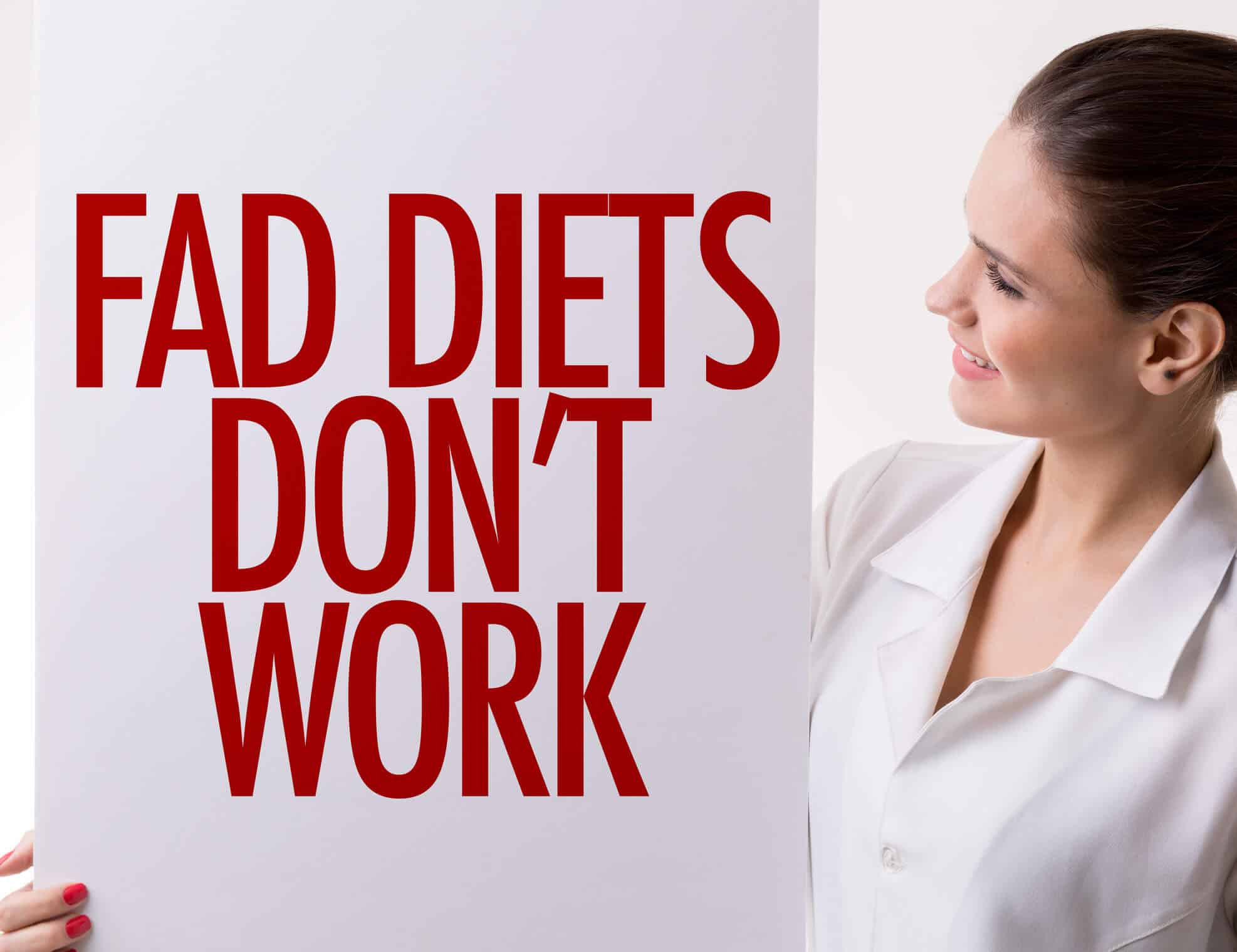Why Rapid Weight Loss Doesn’t Last
If you’ve been lured in by the idea of losing 20 pounds in under a month, you’ve been caught in the promise of rapid weight loss. Creators of diets, supplements, and workout programs have long made promises about losing weight fast that have focused on convincing you that losing an extreme amount of weight in a short time is safe, effective, and long-lasting, but that’s not the whole story.
Effectively losing weight is about more than seeing the pounds drop on the scale. Long-lasting changes require time and attention to what you’re eating (food choice), when you’re eating (food timing), and how you’re eating (the type of foods). Let’s take a closer look at the types of diets that promise rapid weight loss and how the body really reacts.
Types of Rapid Weight-Loss Diets
The three most common types of rapid weight-loss diets are restrictive eating, VLED (very-low-energy diet), and VLCD (very low-carb diet).
Restrictive Eating
Probably one of the more severe types of rapid weight-loss diets is based on restriction. Restricting the foods you eat, to an extreme level, can lead to weight loss over the short term, but there are potential risks to consider.
You don’t have to restrict eating to lose weight. Noom teaches you how to eat the foods you love in a way that you lose weight naturally – for good!
Very Low-Energy Diet
Next up is a star in rapid weight loss – the very low-energy diet. Typically used to treat obesity, a very low-calorie diet does work to promote rapid weight loss, but unfortunately, the results among men and women differ, in that, men tend to keep off more of the weight than women who experience more rapid regaining of weight.
Very Low-Carb Diet
Rounding out the list is the ever-popular, very low-carb diet. Today, the most common of these diets is the keto diet, but you’ll often find references to paleo, generic low-carb, meat fasting, and egg fasting. While some of these extreme diets will work for weight loss, lasting weight-loss is elusive. It may just be that the human body isn’t prepared to function, long-term, lacking carbohydrates.
Across the board, restrictive eating, VLED, and VLCD just don’t work to promote lasting change in weight. Here’s a closer look at why rapid weight loss via extreme dieting, and often excessive exercise, is not a long-term option.
Problems and Risks with Rapid Weight Loss
It’s not hard to find a wealth of science and advice from thought leaders that reinforces the claim that rapid weight loss doesn’t last. But why doesn’t it last?
First and foremost, rapid weight loss tends to be extremely difficult to maintain over time. This means you may lose weight, but you won’t keep it off, and that’s thought, in some cases, to be more detrimental that slowly losing weight over time.
We also found that when losing weight quickly, the body tends to feed off of fat-free mass – in most cases, protein via muscle. However, losing weight via fat-free mass (such as lean muscle loss) often leads to weight regain over the long-term.
Another important consideration is the impact of rapid weight loss on metabolism. Research has shown that losing weight too fast actually causes your metabolism to run more slowly. This is because the body “believes” it must conserve the energy (calories) it IS getting to ensure survival. That means losing weight too fast can lead to weight regain with people often regaining more weight than they lost.
The slowing of metabolism and the possibility of regaining weight are just the start. To lose weight rapidly, you’ll need to restrict food intake drastically. Such restriction ensures you won’t receive the proper nutrition (from food sources). Lacking adequate nutrition can cause a wealth of health concerns, including a negative impact on hair growth and immune function.

Fad and Extreme Dietary Changes and Health
You can’t have a discussion about rapid weight-loss without addressing some fad and extreme methods of losing weight and how they impact overall health. We take a look at fad diets and disordered eating, two of the most common factors in rapid weight loss.
Fad Diets
As far back as 1984, researchers have known that fad diets just don’t work. These diets are often based on eating an extremely low number of calories or restricting food intake. Common fad diets include the cabbage soup diet, hCG diet, and VLCD.
Fad Diets Don’t Work
In 1984, after reviewing 14 fad diets, researchers found that none could effectively and safely lead to lasting weight loss. Basically put, “none of the 14 diets reviewed fulfill all of the standards for a sound weight-reduction plan.” (Clinics in Sports Medicine)
Over time, many researchers came to the same conclusion. For instance, long-term effects of fad diets, often touted for promoting rapid weight loss, can have severe impacts on health and longevity. (TCRT)
So, at the end of the day, we know that fad diets are nothing but hype in a market where hope is what most people are looking to find. (Current Nutrition Reports)
hCG Diet: Touching on a specific rapid weight-loss diet that we come across often is the hCG diet. Typically, when using a supplement that claims to contain hCG (human chorionic gonadotropin), you follow a 500-calorie diet. The weight loss on this diet is not lasting. As soon as you return to any diet with a semblance of calories above the 500, you will regain weight and, thanks to extreme hunger, you’re often bound to gain more than you lost.
Disordered Eating
Another issue to consider is the connection between rapid weight loss and disordered eating. Disordered eating, once referred to as eating disorders, includes meal skipping and extreme dieting which inevitably leads to the yo-yo dieting effect.
Researchers have shown that there’s no magic bullet to weight loss. You can’t skip meals to cut calories or attempt to “out-train a poor diet.” (Clinical Medicine Insights)
On the same topic of disordered eating, many rapid weight-loss diets expect that an extreme reduction in carbohydrates or fats will be enough – but these plans do not provide the lasting dietary changes needed to keep weight off. (IJMR)
So, what’s the eventual impact of following one rapid weight-loss diet after another? Yo-yo dieting occurs when weight that is rapidly lost is regained in a short period, often with the person gaining more weight than they lost to begin with.
What Are Some Negative Implications of Rapid Weight Loss?
Rapid weight loss doesn’t provide lasting results unless you take into consideration the potential for health-related side effects of fast weight loss. The possible side effects include muscle loss, decreased metabolism, and negative impacts on overall health and well-being.
Muscle Loss
The only way for rapid weight-loss to occur is with extreme dieting or extreme exercise. In both cases, the potential for muscle loss is high. And, when you lose muscle as part of weight loss, you are more apt to regain the weight lost. (Obesity)
Metabolism
Losing weight too rapidly can affect sleep metabolism. As metabolism slows, even during sleep, the effect is, eventually, weight regain. (Applied Physiology, Nutrition and Metabolism)
This reduction in metabolism is found across various types of diets, including massive weight loss, very low-carb diets, and even athletes are affected by lower metabolism with rapid weight loss. (Journal of Sports Medicine, and Physical Fitness.)
Overall Health
What about the impact of rapid weight loss on health? You can’t lose an extreme amount of weight in a short time without impacting your health. One of the most important effects is seen in metabolic health.
Over the course of studying more than 11,000 participants, one gathering of research shows that the amount of weight you lose, not the rate at which you lose weight, impact various metabolic markers.
Options Better Than Rapid Weight Loss
So, we know that rapid weight loss doesn’t lead to lasting weight loss, but what are the alternatives? One is the weight-loss app Noom. You lose weight making healthy changes so you’re not shedding a bunch of water weight that you’ll regain anyway. This is real weight loss for your real life.
Intermittent Energy Restriction and Circadian Rhythm Fasting
The idea of fasting for weight loss is trendy, but its intermittent fasting that science has shown may work as a safe and effective solution. This is true when the diet is followed in a healthy, structured manner – otherwise, you’re falling into another fad diet trap.
It’s important to note that intermittent fasting has been shown, via clinical research, to promote weight loss effectively. However, the long-term effect on weight maintenance still needs to be discussed. (Cureus)
We also found that fasting can enhance performance and physiological function, essentially “flipping the metabolic switch.” (Obesity)
Unlike disordered eating, intermittent fasting is structured in a way that allows for periods of fasting and “rest” periods between fasts. These rest periods are critical to lasting weight loss and prevention of weight regain. (International Journal of Obesity)
It’s important to remember that intermittent fasting, when done right, is considered a safe means of weight loss, but when calories are restricted to the extreme, it’s nothing more than a fad diet that will inevitably lead to weight regain and the potential for increased risk of specific conditions.
Slow, Incremental Weight Loss
A better solution to rapid weight loss is slow, incremental weight loss. More gradual weight loss tends to lead to improvements in body composition, not seen in more rapid solutions. (Appetite)
Research has shown it best to adopt a step-by-step, incremental approach to weight loss that leads to “optimized body composition.” (Journal of the International Society of Sports Nutrition)
Adopt a High-Protein Diet
A high-protein diet, where fat is replaced with protein, is more effective than other forms of dieting, especially programs designed to promote rapid weight loss. (Journal of the American Dietary Association)
A standard high-protein diet for weight loss pulls between 20% and 30% of calories from protein. Research shows this type of diet is more advantageous than a more traditional standard diet with 15% to 20% of calories from protein. (Healthcare)
Steps to Weight Maintenance
We know fad diets don’t work, and a better option is to fast intermittently and pick up a higher-protein diet. But, what are some additional ways to ensure weight maintenance?
Problem Solving: First and foremost, you have to address the problems associated with regaining weight. The most common problem is that weight is lost using a specific method, say intermittent fasting, but no concern is taken over learning how to eat more traditionally while keeping the weight off. Using problem-solving strategies is critical to lasting change. (Journal of Cardiovascular Nursing)
Check Glycemic Index: Glycemic index (GI) measures the impact of foods on blood sugar. The lower the GI, the more effective the weight-loss food. Foods naturally high in fiber tend to have the lowest GI. There’s even some indication that controlling the glycemic index is an effective means of fighting hunger and inflammation. (American Journal of Clinical Nutrition)
Self-Monitor Food Intake: Yes, science shows us that monitoring the foods we intake is critical to lasting weight loss. This is especially important when watching macronutrient (protein, carb, fat) and/or calorie intake. The idea behind food tracking is adherence. Men and women who track food intake tend to stick with a diet longer, especially when monitoring dinners. (Behavioral Sciences, Scientific Reports)
Adopt Only a Plan That You Can Keep Life-Long: You can’t expect that you’ll maintain a diet with 70% fat (low-carb, keto diet) or calories fewer than 500 (VLED), but there are diets you can adopt that provide lasting change and lasting weight loss. Believe it or not, research still shows that eating right and exercising are critical factors to losing weight and keeping it off. (Sports Medicine)
Get Dietary Counseling: Multiple sources of research shows that dietary counseling can be a critical factor in weight loss and weight maintenance. One of the biggest problems with rapid weight-loss plans is that they aren’t supported by professionals who understand the complexities of losing weight and keeping it off.
Research involving hundreds of people spanning more than 25 studies have all shown that dietary counseling is the crucial factor in making dietary and lifestyle changes with long-term results. (Patient Preference and Adherence, Clinics)
Adopt a Strong Support System: Along the same lines as dietary counseling is a reliable support system. Without a support system to help you through the tough times, you’re less likely to see lasting weight loss. No support, via personal interaction, virtual community, or formal counseling, only leads to regaining the weight you lose. (Medical Clinics of North America)
Probably the simplest way to explain how important a support system, is this quote about any and all weight-loss plans. “They all work…when you stick to them.” Sticking with a diet plan is much more effective when you have people behind you to help you when you stumble along the way. (Nutrition Journal)
List of Diets to Steer Clear of When You’re Ready to Lose Weight
What are some of the fad and trending diets that may be more harmful than helpful when it comes to losing weight the right way?
- Cabbage soup diet
- Grapefruit diet
- hCG diet
- Juicing diet
- Lemonade detox or Master Cleanse
- Baby food diet
- Chew and spit
- Extreme carb restriction
- Extreme fat restriction
- Extreme fasting
- Extreme calorie restriction
- Excessive exercise

Quick Recap on Rapid Weight Loss
Here are a few key points explaining why rapid weight loss isn’t the best solution and why it never works over the long-term.
Fad diets tend to lead to extreme restrictions, and restriction leads to the potential for disordered eating.
Very low-energy and very low-carb diets don’t provide the lasting education and support needed to maintain weight loss over the long-term.
Muscle loss associated with rapid weight loss can lead to reduced protein stores because the body is relying on muscle for energy. Loss of lean muscle mass doesn’t mean your losing fat. It means you’re losing muscle.
What are some healthier, long-term solutions to weight loss that don’t involve extreme changes in diet?
- Intermittent fasting, even circadian rhythm fasting, has been shown in clinical research to promote lasting weight-loss effectively, but only when following in a healthy, sustainable fashion. (Cellular Metabolism)
- Choose programs that provide slow, steady weight loss as these diets leave time to adopt new lifestyle habits that make eating for weight loss second nature.
- Replacing some fat with protein has been shown to support weight loss in a way that offers long-term solutions. It’s essential to maintain a healthy fat intake from sources such as avocados, olive oils, and nuts.
During and following rapid weight loss comes with risks to your body. Some risks include:
- Muscle loss as the body feeds on muscle stores for protein and energy (calories).
- Increased appetite from extreme food restriction.
- Decreased metabolism as the body chooses to hold on to fat in case food isn’t available.
- Negative impacts on overall health from lacking nutrition.
When it comes to weight loss, slow and steady does, in fact, win the race. You have to take the time to learn how to eat and educate yourself on the foods that combat hunger while providing the utmost in nutritional support.
There’s also an indication that the people you have beside you and behind you along the way is critical to your success. Apps like Noom work wonders to partner people with counseling via personal coaches and healthy solutions to eating less while focusing on better nutrition and lasting weight loss.
At the end of the day, any extreme, rapid weight-loss diet is going to come with risks – including risks to health that can have long-term ramifications. Eat right, move more, and dedicate just 10 minutes a day to a program like Noom to see the changes you want to see in your body.
Why Rapid Weight Loss Doesn’t Last Questions & Answers
- Recent:
Rapid weight loss typically has a short-term effect, as most of the pounds that are lost are from water weight. It is important to maintain healthy eating habits and exercise regularly in order to maintain the weight loss. Long-term weight loss requires dedication and lifestyle changes such as maintaining a balanced diet and committing to regular physical activity.

Summer Banks has researched over 5000 weight-loss programs, pills, shakes and diet plans. Previously, she managed 15 supplement brands, worked with professionals in the weight loss industry and completed coursework in nutrition at Stanford University.
